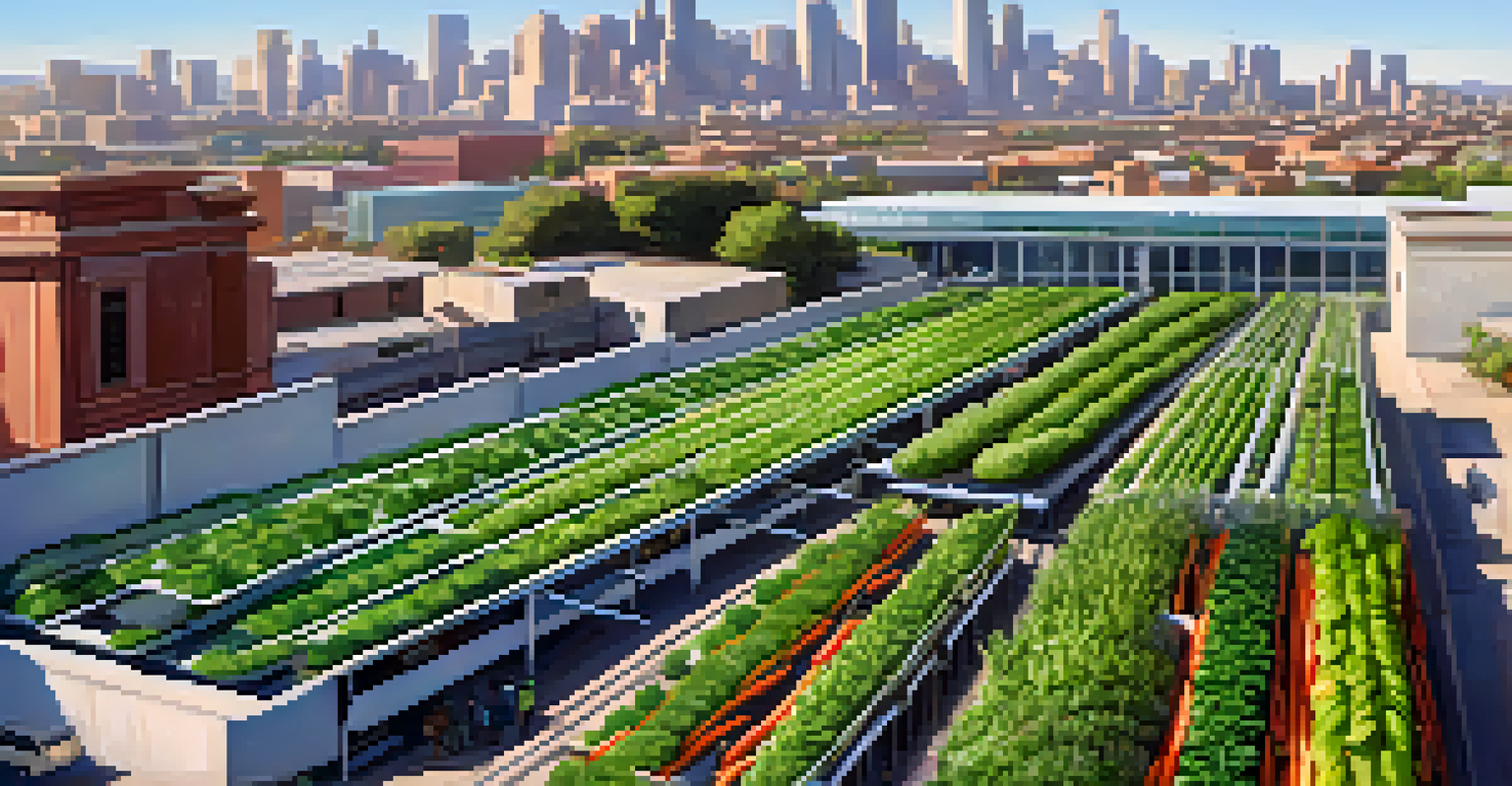Hydroponics: Revolutionizing Crop Production in Arizona

Understanding Hydroponics: A Brief Overview
Hydroponics is a method of growing plants without soil, using nutrient-rich water instead. This innovative technique allows for greater control over plant growth and can yield crops more quickly than traditional farming. In Arizona, where the climate can be challenging for outdoor farming, hydroponics presents a viable solution for sustainable agriculture.
Hydroponics is the future of farming, allowing us to grow more food with less water and less land.
By using hydroponics, farmers can optimize space and resources, making it possible to grow food in urban areas or regions with limited arable land. For instance, vertical farming, a subset of hydroponics, utilizes stacked layers to maximize crop output in a smaller footprint. This approach not only conserves water but also reduces the need for pesticides and herbicides.
As interest in hydroponics grows, so does the potential for innovative agricultural practices in Arizona. The state's unique environmental conditions make it an ideal candidate for this farming method, providing opportunities for local farmers to increase production efficiency and sustainability.
The Benefits of Hydroponics in Arizona’s Climate
Arizona's hot and arid climate poses challenges for traditional agriculture, including water scarcity and soil degradation. Hydroponics offers a solution by using up to 90% less water than conventional farming. This is particularly crucial in a state known for its water limitations, making hydroponic systems an attractive option for sustainable crop production.

Moreover, hydroponics allows farmers to grow crops year-round, independent of seasonal weather variations. This stability can lead to a more consistent food supply, which is essential for local markets and consumers. For example, lettuce and herbs can be cultivated continuously, providing fresh produce regardless of external conditions.
Hydroponics: Sustainable Farming Solution
Hydroponics reduces water usage by up to 90% and allows for year-round crop production, making it ideal for Arizona's challenging climate.
By adopting hydroponics, Arizona's farmers can mitigate the impacts of climate change on agriculture. The controlled environment of hydroponic systems not only enhances crop resilience but also reduces the carbon footprint associated with transporting food over long distances.
Economic Impact: Boosting Local Farming and Jobs
The rise of hydroponics in Arizona is not just about growing food; it has significant economic implications as well. As more farmers transition to hydroponic systems, new businesses emerge, creating jobs in farming, technology, and distribution. This shift can lead to a revitalization of local economies, particularly in rural areas.
Sustainable agriculture is not just a trend; it's a necessity for our planet's future.
Hydroponics also allows for higher crop yields, which can translate to increased profits for farmers. With the ability to produce more food in less space, growers can meet the demands of local grocery stores and restaurants, fostering a strong farm-to-table movement. For instance, urban hydroponic farms can supply fresh ingredients to nearby eateries, enhancing the local culinary scene.
Furthermore, as consumers become more conscious about where their food comes from, hydroponically grown produce often commands a premium price. This trend not only benefits farmers financially but also encourages sustainable practices that resonate with environmentally aware consumers.
Innovative Technologies in Hydroponic Systems
Hydroponics is constantly evolving, thanks to advancements in technology. Innovations such as automated monitoring systems and climate controls allow farmers to optimize their growing conditions. For instance, sensors can track nutrient levels and water pH, ensuring plants receive exactly what they need for optimal growth.
Additionally, the integration of artificial intelligence and machine learning into hydroponic systems can predict crop yields and improve resource management. With these technologies, farmers can make data-driven decisions that enhance efficiency and reduce waste. For example, smart irrigation systems can adjust water delivery based on real-time data, significantly conserving resources.
Economic Growth Through Hydroponics
The rise of hydroponic farming in Arizona is creating jobs and boosting local economies by increasing crop yields and supporting farm-to-table initiatives.
As technology continues to advance, the possibilities for hydroponics seem limitless. Arizona is well-positioned to be at the forefront of these innovations, potentially leading the way in modern agricultural practices that could be adopted globally.
Hydroponics and Environmental Sustainability
One of the most appealing aspects of hydroponics is its potential for environmental sustainability. By using less water and eliminating the need for harmful pesticides, hydroponic systems can significantly reduce agriculture's environmental impact. This is particularly beneficial in Arizona, where water conservation is critical.
Moreover, hydroponics can help combat soil degradation, a significant issue in traditional farming. Since crops are grown in nutrient solutions rather than soil, there is no risk of soil erosion or depletion of essential nutrients. This practice preserves the land for future generations and maintains biodiversity.
By embracing hydroponics, Arizona can lead the way in environmentally sustainable agriculture. This not only supports local ecosystems but also contributes to global efforts to mitigate climate change and promote food security.
Challenges Facing Hydroponic Farmers in Arizona
Despite its many benefits, hydroponics does not come without challenges. Initial setup costs for hydroponic systems can be high, which may deter some farmers from making the switch. This investment includes purchasing equipment, growing mediums, and nutrient solutions necessary for successful crop production.
Additionally, hydroponic farming requires a specific skill set that may not be familiar to traditional farmers. Understanding the intricacies of plant nutrition and system management can be daunting. However, education and training programs are emerging, helping farmers gain the knowledge they need to thrive in this new agricultural landscape.
Innovation Drives Hydroponic Success
Advancements in technology, such as automated systems and AI integration, are enhancing the efficiency and sustainability of hydroponic farming.
Despite these challenges, the potential rewards of hydroponics make it an appealing option for many. By addressing these hurdles through support and resources, Arizona can foster a robust hydroponic community that benefits both farmers and consumers alike.
The Future of Hydroponics in Arizona
As we look to the future, the role of hydroponics in Arizona's agricultural landscape is set to grow. With increasing interest from consumers in locally sourced and sustainably produced food, hydroponic farms are likely to become more prevalent. This trend presents an exciting opportunity for farmers to adapt and innovate.
Moreover, collaboration between universities, research institutions, and local farms can pave the way for further advancements in hydroponic technology. By working together, these entities can develop new techniques and share best practices that enhance productivity and sustainability. For example, research into new nutrient solutions could lead to even healthier crops.

Ultimately, the future of hydroponics in Arizona is promising. With the right support and continued innovation, hydroponic farming can play a crucial role in ensuring food security and environmental sustainability in the state for years to come.